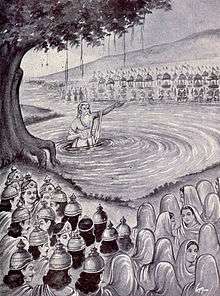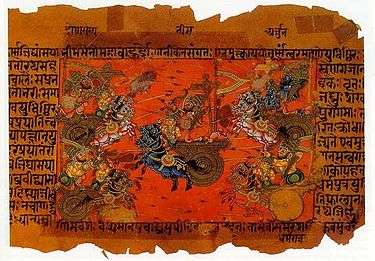Ashramavasika Parva

Ashramvasik Parva (Sanskrit: आश्रमवासिक पर्व), or the "Book of Hermitage", is the fifteenth of eighteen books of the Indian epic Mahabharata. It has 3 sub-books and 92 chapters.[1][2]
Ashramvasik Parva describes 15 years of prosperous rule by Yudhishthira after the great war. The Pandavas and Kauravas have lived in peace, with Yudhishthira consulting with Dhritarashtra on matters of governance. Draupadi becomes friends with Gandhari, Vyasa and other sages visit the kingdom with their fables and wisdom. The parva recites the next two years when Dhritarashtra and Gandhari take Sannyasa and live a hermit's life in a forest.[1][3]
Structure and chapters

Ashramvasik Parva (book) has 3 sub-parvas (sub-books or little books) and 92 adhyayas (sections, chapters).[2] The sub-parvas are:
- 1. Asramavasa Parva
- This sub-book describes the 15 years of prosperous rule by Yudhishthira, followed by the departure of Kunti, Dhritarashtra and Gandhari to Vyasa's hermitage for sannyasa.
- 2. Putradarsana Parva
- This sub-book recites the visit of Pandavas to meet Kunti, Dhritarashtra and Gandhari at the hermitage. It also mentions Vidura and his death.
- 3. Naradagamana Parva
- This sub-book describes the death of Kunti, Dhritarashtra and Gandhari. Narada visits to console those in grief. Yudhishthira performs cremation rites for all of them.
The parva describes the 15 year rule by Pandavas with Yudhishthira as the king. After 15 years of peaceful co-existence, Dhritarashtra and his wife seek sannyasa (renunciation of domestic life for moksha). They leave the kingdom and head into the forest to Vyasa's hermitage. Yudhishthira attempts to dissuade them, but they insist on completing their fourth period of ashrama life. Kunti, Sanjaya and Vidura join them in the hermitage. Vidura was the first to die. After two years of hermit life, all three - Kunti, Dhritarashtra and Gandhari - too pass away, in a forest fire. The news of their death causes grief to Pandavas and citizens of the kingdom. Sage Narada appears and consoles them. Yudhishthira performs Shraddha rites for those who had died at the hermitage.[1]
English translations
Ashramvasik Parva was composed in Sanskrit. Several translations of the book in English are available. Two translations from the 19th century, now in the public domain, are those by Kisari Mohan Ganguli[2] and Manmatha Nath Dutt.[1] The translations vary with each translator's interpretations.
Debroy, in 2011, notes[4] that updated critical edition of Ashramvasik Parva, after removing about 30% of verses generally accepted so far as spurious and inserted into the original, has 3 sub-books, 47 adhyayas (chapters) and 1,061 shlokas (verses).
Quotes and teachings
Ashramvasika parva, Chapter 5:
Let thy judicial officers, O Yudhishthira, inflict punishments on offenders, according to the law, after careful determination of the gravity of the offenses.
Putradarsana parva, Chapter 34:
He who knows himself attains the highest understanding and becomes freed from error,
All creatures appear from an invisible state, and once more disappear into invisibleness.
He enjoys, or endures, the fruits of all his act, where he does them,
If the act be a mental one, its consequences are enjoyed, or endured, mentally;
If it is done with the body, its consequences are to be enjoyed, or endured, in the body.
See also
References
- 1 2 3 4 Ashramvasik Parva The Mahabharata, Translated by Manmatha Nath Dutt (1905)
- 1 2 3 Ashramvasik Parva The Mahabharata, Translated by Kisari Mohan Ganguli, Published by P.C. Roy (1893)
- ↑ John Murdoch (1898), The Mahabharata - An English Abridgment, Christian Literature Society for India, London, pages 125-128
- ↑ Bibek Debroy, The Mahabharata: Volume 3, ISBN 978-0143100157, Penguin Books, pp. xxiii - xxiv of Introduction
- ↑ Ashramvasik Parva The Mahabharata, Translated by Kisari Mohan Ganguli (1895), Chapter 5, page 16
- ↑ Ashramvasik Parva The Mahabharata, Translated by Kisari Mohan Ganguli (1895), Chapter 34, page 77
External links
- Ashramvasik Parva, English Translation by Kisari Mohan Ganguli
- Ashramvasik Parva, English Translation by Manmatha Nath Dutt
- Ashramvasik Parva in Sanskrit by Vyasadeva with commentary by Nilakantha - Worldcat OCLC link
- Ashramvasik Parva in Sanskrit and Hindi by Ramnarayandutt Shastri, Volume 5
